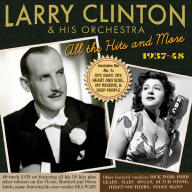Clinton's specialty was "jazzing the classics," transforming familiar classical melodies into dance hits; for example, Claude Debussy's early piano piece Reverie became My Reverie and an enormous hit with a lovely Bea Wain vocal. Clinton also similarly transformed music by Tchaikovsky, Flotow, and the hoary anthem I Dreamt I Dwelt in Marble Halls into solid sensations -- musicians' scuttlebutt of the era in reference to Clinton eulogized such efforts as "it goes into one ear and flows out of his pen." Purists cried "desecration," but Clinton defended his work by stating that he was bringing quality music to the dancefloor. Clinton did have some hot players in his band, but seldom if ever used them to contribute solos to raise the heat; as one would expect from an arranger's band, the emphasis was on precise execution of his dance charts as written. Several of Clinton's other compositions were more challenging, representing an interest in the "egghead jazz" of Raymond Scott and Ray Noble in pieces such as Strictly for the Persians and The Campbells Are Swingin'. Many of Clinton's original pieces reflect an interest in the supernatural and Satanism, such as Midnight in the Madhouse, Shades of Hades, The Devil with the Devil, Satan in Satin, Study in Surrealism, and one 1938 vintage number that perhaps was a premonition of things to come -- I Want to Rock (Rock Solid Rock).
Larry Clinton broke up his big band in 1941 in order to join the military as a pilot. He was commissioned as a flight instructor, served with distinction, and was well decorated for his efforts. After the war, Clinton worked for the short-lived Cosmo label, worked at Kapp, and re-recorded his hits with a pickup band in hi-fi sound with singer Helen Ward for his old haunt, RCA Victor. Nevertheless, the big-band business was dead, and Clinton retired from music in 1961 to pursue other interests, mainly writing fiction. Clinton's work is unfairly neglected and is often referred to as "Mickey Mouse" or as having "no jazz interest." However, it was highly intelligent, sophisticated, and extremely well-played music, and Wain in particular was a major artist, a singer every bit as good as her competitors, who included Helen Forrest, Nan Wynn, and the young Ella Fitzgerald. So while Larry Clinton may not have led the jazziest swing band, it was nonetheless a fun and exciting dance orchestra, and his 214 78-rpm sides for Victor and Bluebird -- Clinton's core output -- are well worth remembering and appreciating on their own terms. ~ Uncle Dave Lewis, Rovi


















